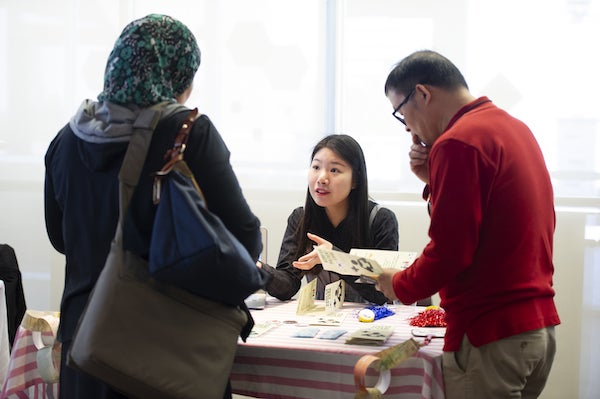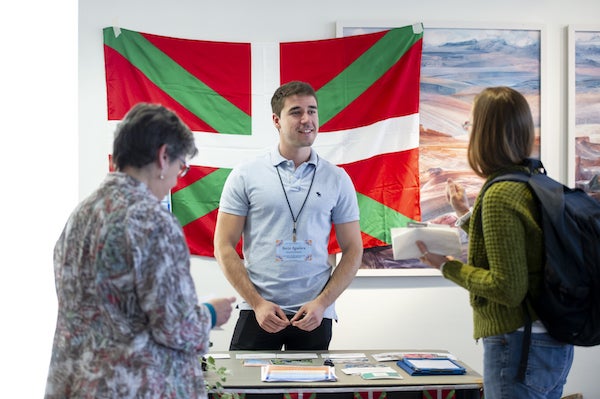In a rural state like ours, the opportunity to learn foreign languages in K-16 public schools can be limited. Teachers sometimes struggle to find high-quality teaching resources as they build communities of language learners. In some cases, said Amber Hoye, director of the World Languages Resource Center, public schools are relying on language teachers to create their own curriculums.The Pathways Open Educational Resource Repository, an inaugural project in Boise State’s Department of World Languages led by Hoye and Associate Professor Kelly Arispe, is looking for a solution.
Over the past semester, 13 upper-division language students from a range of disciplines, including nursing, business and graphic design, have created a collection of open (i.e. free) digital language and culture lessons that are classroom-ready for teachers in public schools.
Their website, https://www.boisestate.edu/worldlang/pathways/, has recently gone live. Lessons and activities are available in French, American Sign Language, Japanese, Spanish, Basque, Mandarin Chinese, German and Korean.
“I love how our students have married their passions with their love for languages,” said Hoye.
Chloe Pampush is a junior in the Honors College from Tillamook, Oregon, majoring in graphic design and minoring in German. Pampush created a collection of inclusive icons for teachers to download for flashcards or other visual aids. Examples include a bank icon that shows marks for euros and yens, not just dollars, and a post office icon that includes logo colors from offices in other countries, not just the familiar red, white and blue of the U.S.
Language and cultural instruction was limited in her own high school, she said, and she would have benefitted from a project like hers.
“One of my motivations for getting into graphic design was being creative, but also having the opportunity to make work with the potential to help a group of people,” Pampush said.

Daum Jung, a sophomore nursing major from South Korea, focused on Korean culture for her project. She wrote a brochure for use by people in medical fields that briefly outlines Korean cultural norms. Patients, for example, frequently avoid eye contact with doctors. Patients may turn to homeopathic remedies along with traditional treatments. The brochure also includes basic survival phrases. It’s ready for language teachers, but in the meantime, university health services and a regional hospital plan to print Jung’s brochure for their own use.
“It’s nice to part of this cause,” said Jung, “and to have the opportunity to help language teachers in Idaho have a variety of ways to help students be more engaged and interactive.”
The Pathways Open Educational Resource Repository grew out of the campus language lab — a familiar place for students learning a new language at Boise State. Instructors and student lab assistants already had been working on revamping lab materials to make them more relevant for the real world.
“We thought, let’s share our collection,” said Hoye.
As the name of the project indicates, it is in line with Boise State’s support of Open Educational Resources — articles, courses, images, data, video and code – that are in the public domain or released under an open license and free for anyone to use. The project also is one of 19 current Vertically Integrated Projects affiliated with the College of Innovation and Design that let students earn academic credit while working with faculty on research projects that benefit the community.
Those benefits will be substantial, said Jacqueline Woods. She graduated from Boise State in 2016 with a degree in secondary Spanish education. She teaches Spanish 1 at Meridian High School in the West Ada School District. Though West Ada is the largest district in the state, many schools in the district have just one language teacher, said Woods. She’s one of three Spanish teachers at Meridian High, but the sole teacher at the Spanish 1 level.
“We’re trying to not teach languages out of textbooks as much, but to get kids to talk to each other and to read instead. Now, if I have students read something in Spanish, it’s something I’ve had to write myself, and that takes time.”
Woods teaches on a block schedule with classes of 30-40 students that meet a few times a week. Each class lasts 90 minutes. Woods has to find activities that fill those minutes and keep teenagers engaged.
“Having a place online where I can find materials that require nothing more than a tweak, getting more ideas for encouraging kids to speak in Spanish will be amazing,” Woods said.
Hoye, Arispe and the students recently showed off their work at an open house for language teachers. Hoye reached out to teachers across the state through the Idaho Association of Teachers of Language and Culture. She even did a bit of detective work, filing a public records request for a list of Idaho teachers who have a second language teaching endorsement. She invited all of the teachers to campus. Around 80 teachers came. Around 20 more attended online.
“Participants enjoyed interacting with the student projects and many left excited to either introduce the materials in their classroom and get further involved with the Pathways project,” said Hoye.

Hoye and Arispe want to continue the Pathways project and expand its offerings. They have applied for Open Education Resources grants to support it. As a follow up to the open house, they will lead an Open Educational Resources Institute for 26 language teachers in May in partnership with the Center for Teaching and Learning.
“We’re passionate that all teachers should have access to high-quality materials, no matter where they are,” said Hoye.